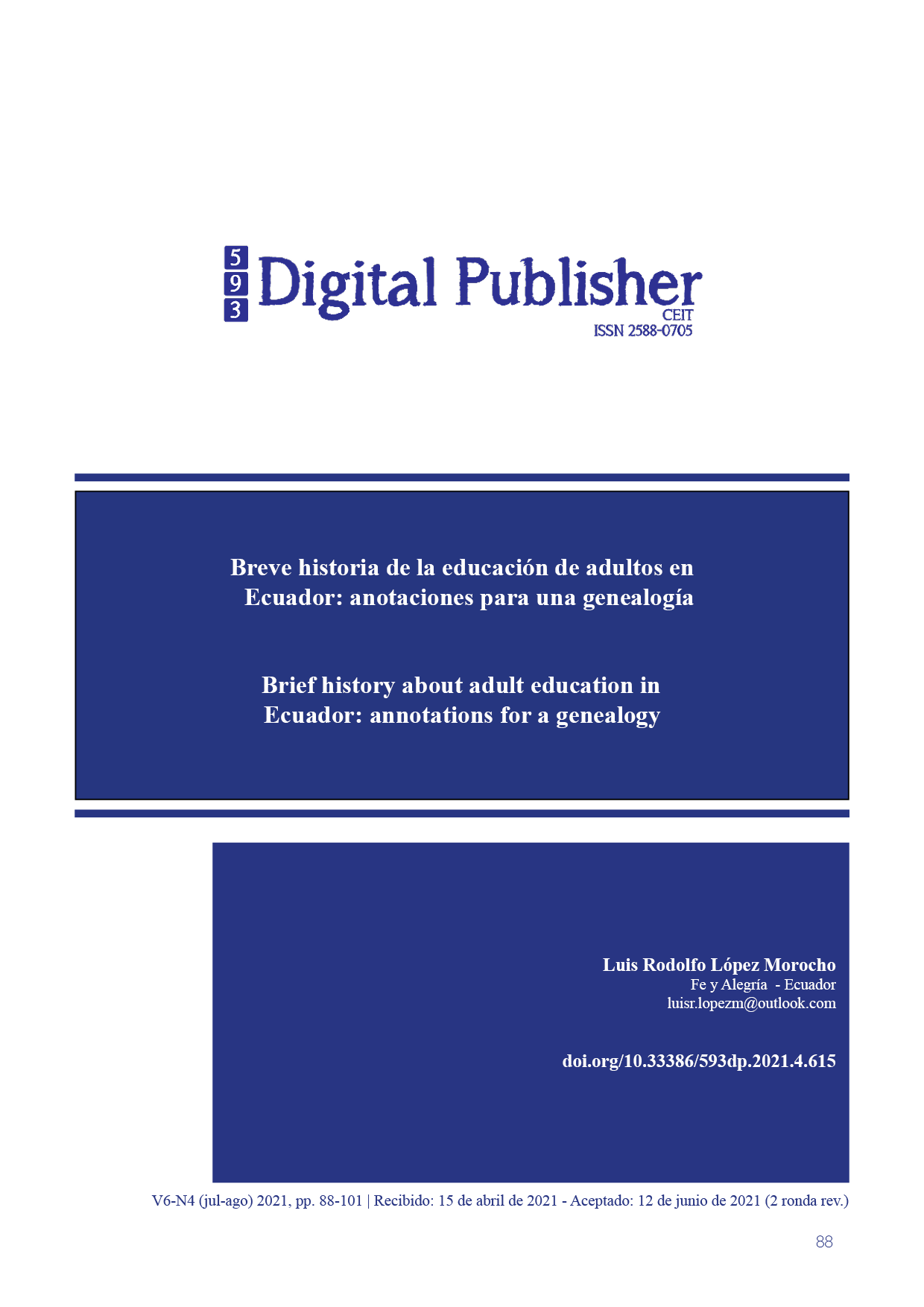Brief history about Adult Education in Ecuador: annotations for a genealogy
Main Article Content
Abstract
In this work, the origin of adult education in Ecuador is sought, considering its conditions of possibility, both historical and conceptual. In this way, a historical overview of the main adult education initiatives is carried out since their appearance in the 1940s through literacy campaigns, programs and projects that promoted adult education marked by diverse political and economic contexts. Influenced by international visions of education that have led to so-called intensive or accelerated offers that allow the completion of adult studies in short times. Together with this, laws and curricula have appeared that govern this type of education and allow us to appreciate the approaches and intentions of these initiatives.
Downloads
Article Details

This work is licensed under a Creative Commons Attribution-NonCommercial-ShareAlike 4.0 International License.
1. Derechos de autor
Las obras que se publican en 593 Digital Publisher CEIT están sujetas a los siguientes términos:
1.1. 593 Digital Publisher CEIT, conserva los derechos patrimoniales (copyright) de las obras publicadas, favorece y permite la reutilización de las mismas bajo la licencia Licencia Creative Commons 4.0 de Reconocimiento-NoComercial-CompartirIgual 4.0, por lo cual se pueden copiar, usar, difundir, transmitir y exponer públicamente, siempre que:
1.1.a. Se cite la autoría y fuente original de su publicación (revista, editorial, URL).
1.1.b. No se usen para fines comerciales u onerosos.
1.1.c. Se mencione la existencia y especificaciones de esta licencia de uso.
References
Chavert, Silva. 1995. Los mitos de la ecuatorianidad. Quito: Abya yala
DYA. 2016. Programa de educación básica superior flexible. Quito: Mineduc.
Goetschel, Ana. 2007. Educación de las mujeres, maestras y esferas públicas. Quito en la primera mitad del siglo XX. Quito: Abya yala.
INEC. 2012. Nivel de escolaridad de los ecuatorianos. Ecuador: eAnálisis.
Ministerio de Educación. 2009. La alfabetización en el Ecuador. Quito: Unesco.
—. 2008. Informe nacional del Ecuador CONFINTEA VI. Informe Nacional del Ecuador, Ecuador: Mineduc.
—. 2016. Adaptaciones curriculares. Ecuador: Mineduc.
—. 2016. Educación Extraordinaria para personas en situación de escolaridad inconclusa.
—. 2017. ACUERDO Nro. MINEDUC-MINEDUC-2017-00040-A. Ecuador: Mineduc.
—. 2017. Currículo Integrado de Alfabetización. Ecuador: Mineduc.
—. 2018. Educación para jóvenes y adultos. https://educacion.gob.ec/ofer
OEI. 1994. Sistemas Educativos Nacionales. Ecuador. Ecuador: OEI-Ministerio de Educación
Pérez, María. 1991. Visión crítica de los programas de alfabetización en el país. Ecuador: IAEN.
Reinoso, Rodrigo. 2014. Trasmutaciones en el vínculo estado y sociedad en las políticas públicas de alfabetización en el período de 1997-2009 en Ecuador. Quito: IAEN.
Saad, Pedro. 1981. Encuentros y lecciones. Quito: El Conejo.
Torres, Rosa María. 2005. Analfabetismo y alfabetización en el Ecuador. Opciones para la política y práctica. Ecuador: Unesco.
Unesco. 2000 Marco de acción de Dakar. Francia: Unesco
Vergara, Andrea. 2017. Experiencias de las mujeres en la alfabetización: un acercamiento a la escuela de alfabetización, terminación de primaria y formación política Mujeres de Frente. Quito: FLACSO


